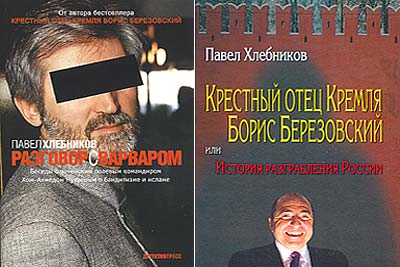
Covers of Paul Klebnikovís books
In his last interview, granted to the Mir Novostei weekly newspaper, Forbes
Russia editor Paul Klebnikov admitted that when he was working on his
book about Boris Berezovsky “Godfather of the Kremlin: Boris Berezovsky
and the Looting of Russia”, he seriously feared for his life. “At
first, the editorial office wanted me and my family to go into hiding,”
Paul recalled. “But it became clear that Berezovsky opted for another
method of settling scores with the author of the book — he took
us to a London court.”
Today the hero
of Klebnikov’s book, Boris Berezovsky, comments on the murder of
his opponent.
The police are investigating several leads behind Klebnikov’s
murder. Among them is the Chechen trail, and the involvement of the special
services. Your name is mentioned as well. Which of those leads do you
deem most credible?
I can say for sure not only which of those is the most credible but
also who committed the crime.
So who is it?
The present-day Russian regime is behind that murder. Undoubtedly, Klebnikov
fell victim to the redistribution of property in Russia initiated by President
Putin. And, to be perfectly serious, Klebnikov became a victim of Putin’s
policy. The president of Russia is at the top of the vertical of authoritarian
power that he built and therefore he must be held fully accountable for
what has happened. This is, so to speak, the general outline.
To be more specific, the murder was the result of a redistribution of
property which is always fraught with a growing crime rate. Klebnikov
wanted, in his own manner and quite professionally, I believe, to look
into the developments going on in Russia. Of course, those who initiated
the redistribution of property were not happy about it.
So, yet again you are implying that Russian special services
are involved in this case?
I would not dare to assert that with full confidence. I am not sure
that Russia’s special services are behind it, although I do not
rule it out. I am talking of the policy to which Klebnikov fell victim.
And as to what that policy resulted in, whether in the actions of the
special services, or a group of angry businessmen, whose wealth Klebnikov
had sought to make public, or of some other people involved in the case,
this is just the consequence of the political climate forming in Russia.
In his list of Russia’s 100 richest people published
in the Forbes Russia edition Paul Klebnikov included, among many others,
Yelena Baturina, the Moscow mayor’s wife, who, according to his
information, is worth $1 billion. Could the threat emanate from people
who were unhappy about the publicity?
I have no grounds to finger Yelena Baturina or any other specific person.
However, in Russia such exposure could be perceived by many of those on
the list as a tip-off to the tax authorities or other political opponents.
This in turn is a threat to their businesses, wealth and career. The response
to such threats often evolves into a contract hit in Russia.
You said that Klebnikov handled information inaccurately.
What did you mean by that?
In his time Klebnikov published materials in the Forbes magazine about
me. The courts ruled the reports were false. This was what the joint statement
I issued together with Forbes read: “The facts, cited by Klebnikov,
were false.” That carelessness with information could also be a
reason for his death.
How do you remember him?
I met him only once in my lifetime when he interviewed me in 1996. I
was meeting a great many journalists then and that is why I cannot remember
him at all. The article published afterwards in Forbes taught me a serious
lesson, whereupon I began paying more attention to whom and about what
I was talking.
That lesson was that even the Western media are capable of publishing
false reports and juggling the facts. And that is what I managed to prove
in a British court. Klebnikov had only proved that Western journalists,
too, lie. After I learned that Klebnikov was not a journalist but a writer
I stopped following his creative work. I prefer Nabokov, Bunin, Bulgakov.
Klebnikov was a US citizen. Will his murder tell on the
relations between the US and Russia?
This is a question for Putin and Bush.
See also:
Freedom
of Speech and Media Law in Russia
|